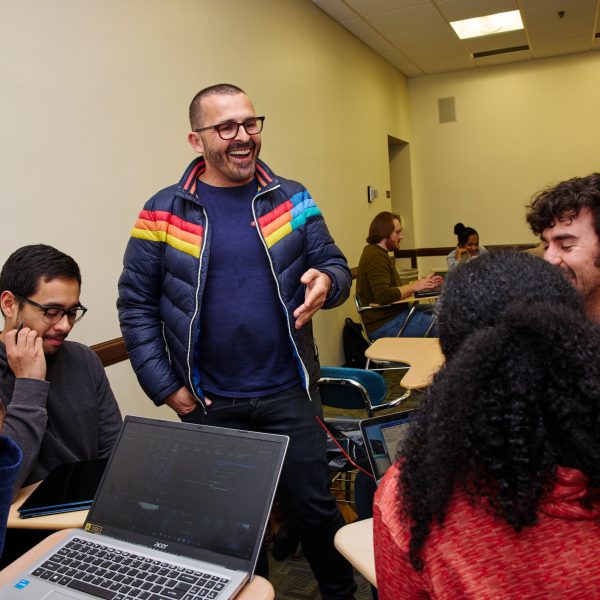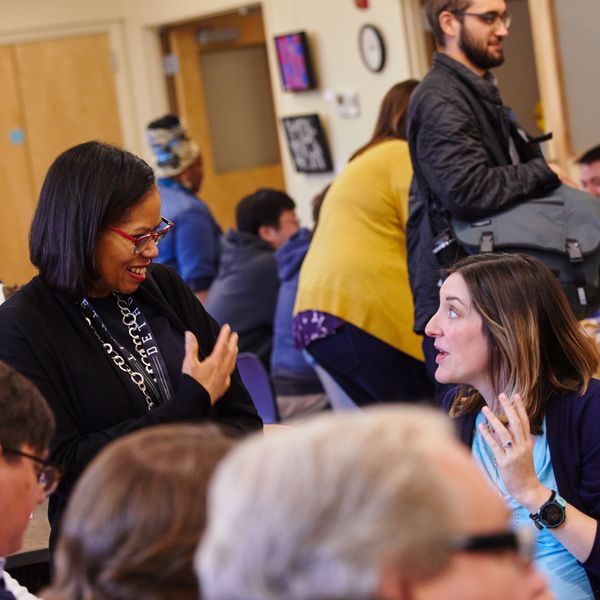Contextual Education internship placements help prepare STH students for practical leadership in a variety of organizational settings. Whether you have no experience in religious leadership or quite a bit already, the ConEd office can help you find a placement site where you can grow your professional abilities and theologically reflect on the work you do. Most students complete their Contextual Education requirements as part of the second year of their degree program, which requires planning during their first year.
Students completing an internship placement spend an average of 15 hours per week in on-site leadership. They also take part in a weekly small group course entitled “Integrating Theology and Practice,” which includes some light reading and assignments. Students should plan for 20 total hours per week to be spent in ConEd-related work during the semesters in which they complete an internship placement.
What will I do at my internship placement?
Before you begin your placement, you’ll create a Learning Agreement outlining up to five personal learning goals for the semester along with the tasks that you plan to do at your site to help you meet those goals. For example, a learning goal could be “to improve my understanding of how a non-profit manages its finances” and tasks could include attending budget hearings or Board meetings during which finances are discussed. A student interested in honing their public speaking skills could include the task of preaching twice each semester on their Learning Agreement. This document will be negotiated with your site supervisor to make sure it is achievable at your site within the allotted weekly hours. We don’t want students working too much or too little, so finding the right balance of learning goals and tasks is important. If you aren’t sure of your learning goals, a conversation with the Contextual Education Office Director could help! Feel free to reach out for a meeting either formally, to discuss a particular ConEd idea or plan, or informally by email.
Are internship placements paid work?
Contextual Education is a curricular degree requirement and a learning opportunity, not a paid position of employment at an organization. So, no, these internship placements are not necessarily paid work. That said, some of our partner sites do offer paid internship positions, while others do not. Students should be mindful of asking potential sites about this as they determine where their internship placement site will be. Sites that cannot pay their students an hourly wage are still asked to contribute to their student’s financial wellbeing through providing some scholarship funding support, which typically ranges between $1500/semester and $2500/semester, depending on the budget of the organization. Finally, the School of Theology provides a Contextual Education scholarship of $1000 per semester to eligible MDiv and MTS students fulfilling their required Contextual Education credits through a placement internship or Clinical Pastoral Education (CPE).
How do I find an internship placement site?
You will begin the process by meeting with someone in our office, who can help you locate the right site for your learning. Students can also peruse our online site listings book, which is kept up to date with sites that have expressed interest in having an intern. Once you have determined one or two sites where you would like to intern, you will reach out to those sites directly to negotiate and formalize a placement with one of them. During this phase you should also have meetings with the potential supervisor at the site and/or visit the site to determine if it is a good fit for you.
Once you have made a final decision, and have been approved by the site supervisor for an internship at their site, you then complete a Placement/Project Request Form to seek site approval from the Contextual Education Office. Our office team reviews your request and is either in touch with questions of clarification or provides your site approval. Once approved, you can register for your Contextual Education “Integrating Theology and Practice” course, which accompanies all internship placements (course numbers TC 801 – 804). If at any point during this process you need support, you can always reach out to the Contextual Education Office (sthope@bu.edu).
See our “ConEd Process Checklist” for deadlines and more detailed information on each step mentioned above.
Who is eligible for ConEd internship placements?
| Master of Divinity | MDiv students are required to complete six units (2 semesters) of internship placement as a core requirement of the MDiv curriculum. Once they have completed these six units, they are welcome to complete additional internships for free elective credit in their program, up to 18 credits total. MDiv students in the Chaplaincy Track may use Clinical Pastoral Education (CPE) to fulfill their ConEd internship placement requirements. |
| Master of Theological Studies | MTS must complete three units (1 semester) of Contextual Education as part of their program’s core curriculum, and this can be fulfilled in a variety of ways: through an internship placement, a ConEd Project, Clinical Pastoral Education (CPE), or a Travel Seminar. |
| Master of Sacred Theology | STM students in the Religious Leadership Concentration are eligible to use a Contextual Education internship placement to fulfill their TF 810 Supervised Practicum I & II, if the site is approved by both their STH faculty advisor and the Contextual Education Office. This option requires the completion of a Religious Leadership Paper upon conclusion. Please see the STM program description for more information. |
| Master of Arts in Religion & Public Leadership | MARPL students are required to complete a three unit (1 semester long) Contextual Education Leadership Project rather than an internship placement. |
| All Other Master’s-Level Students | All other Master’s-level students are welcome to be in touch with the Contextual Education Office to determine whether an internship placement would fit into their curriculum. We are happy for as many students to pursue internships as possible, as it is a wonderful way to enhance one’s learning with practical experience and theological reflection. |
| International Students | International students must receive authorization for all off-campus work, including Contextual Education placements. Please see the International Student Considerations section of this website for more information. |
A special note for incoming first-year students:
We typically do not allow entering students to pursue ConEd in the first semester of their program for a variety of reasons. First, purely from a timing standpoint, they would have had to negotiate the ConEd placement paperwork deadlines, which fall between four and six months prior to the start of each semester. This paperwork cannot be skipped or rushed, so it is typically best for entering students to meet with someone from the ConEd Office once they matriculate into the School of Theology to discuss their options in future semesters. (An exception is occasionally made for transfer students who enter technically mid-program and who may need to pursue ConEd right away to have time to fulfill all their curricular requirements. Those situations are considered on a case-by-case basis, starting with a conversation with the Contextual Education Director.)
There is also another reason for limiting entering students from pursuing ConEd internship placements in their first semester. ConEd is a 20-hour-per-week curricular endeavor, which can be difficult to balance with an entering student’s other first-semester concerns, such as making connections to a new school community, finding their way around Boston, and navigating seminary coursework. Many first semester students who have pursued ConEd right away have reported feeling overwhelmed or unable to find the time to deepen connections to the seminary community. Additionally, the “Integrating Theology and Practice” course requires a good deal of advanced theological reflection work, which is often difficult even for second-year students.
First semester students should use their first semester to dig deeply into their STH coursework, form friendships, and explore the Boston area. If they’d like to get a head start on their ConEd plans, they could also occasionally visit area churches/religious communities/and non-profit organizations of interest to determine where they may eventually want to pursue an internship placement. And all students – prospective, incoming, and current students of any program – are always welcome to meet with the Contextual Education Office at any time for support in vocational discernment, career planning, or personal formation support.
Notice of Boston University School of Theology State Authorization Reciprocity Agreement (SARA) and Boston University Approval:
The following information is listed for university compliance purposes only. It is pertinent only to students who pursue Contextual Education outside the state of Massachusetts, and is meant to promote equity for hybrid/online students.
The State Authorization Reciprocity Agreement (SARA) is a voluntary agreement amongst member states, territories, and districts of the United States that establishes one set of national standards and rules for distance education offerings. States that wish to become members of SARA apply to their regional education compact for approval. Once a state has been approved, institutions within that state may apply to the designated state portal entity for approval to participate in SARA. Currently, 49 states (all but California), the District of Columbia, Puerto Rico, and the U.S. Virgin Islands have joined SARA. Boston University has been approved under the terms and provisions of SARA to operate its distance education programs in SARA-approved locations.
Boston University State Authorization and Distance Education Disclosures site provides a variety of information regarding distance education programs, including:
- Complaint Resolution process for Massachusetts, and each state
- Information on the Refund Policy applicable to students in distance education programs
- Information about distance education programs that lead to professional licensure and certification; and
- Authorizations by State: State-by-state authorizations and information, including complaint procedure information for the location and any state-specific disclosures.
Students participating in contextual education placements that occur outside of Massachusetts have rights under the State Authorization Reciprocity Agreement (SARA) related to complaint resolution. Boston University’s state authorization approval and related complaint resolution process is itemized here: State Authorization and Distance Education. Students at BU School of Theology should contact the Director of Contextual Education or the Academic Dean for more information.



